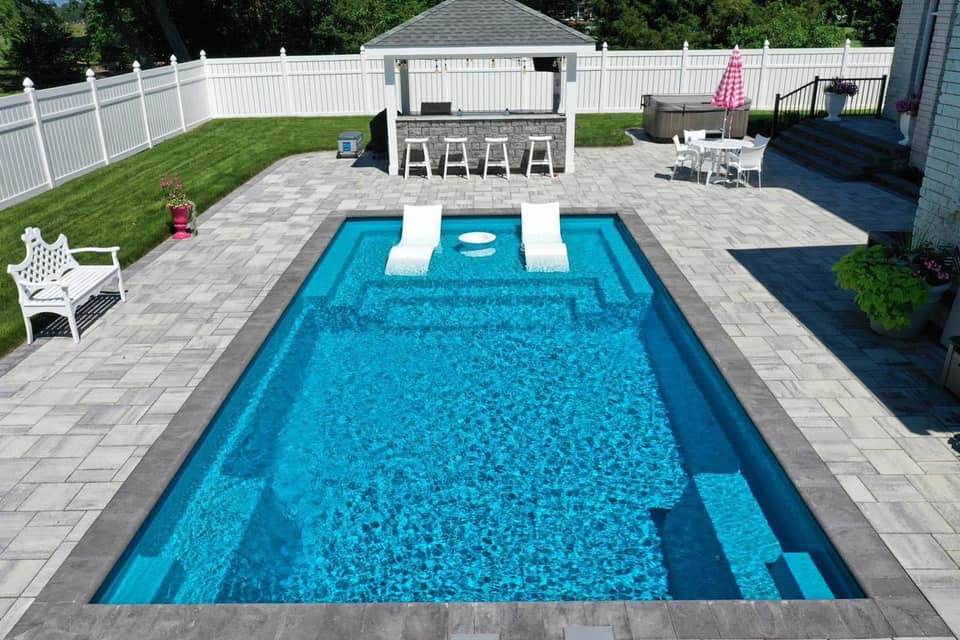Are you a confused swimming pool owner wondering if you should cover your inground swimming pool when it’s not in use? While it’s not mandatory, many pool owners choose to cover their pools. The question is—what are the benefits of covering your pool?
Before you decide whether to invest in a swimming pool cover, it’s important to understand the pros and cons involved. While the most obvious advantage is that a pool cover would protect your pool from unwanted dust and debris, there are a handful of other advantages and disadvantages to be aware of before making your choice.
Benefits of Swimming Pool Covers
Not sure if a swimming pool cover is the right move for you? Here are some of the top benefits to consider:
1. Maintains Pool Temperature
One of the main reasons why people choose to cover their swimming pools is that it helps to retain heat. If your pool relies on the sun for heat, rather than a pool heater, then you know just how unpleasant the chilly water can be early in the day before the sun has had a chance to do its job. By covering your pool at night, you can help to reduce overnight heat loss so your pool stays warmer day to day.
2. Reduces Dirt and Debris
When you leave your pool uncovered even for a night, it’s not uncommon to wake up to the sight of twigs, leaves, bugs, toys, and other debris in your swimming pool. While you could spend an hour each day fishing out every item that fell into your pool overnight, it’s much easier to simply keep your inground pool covered when it’s not in use. That means less time spent cleaning and more time spent swimming!
3. Cuts Down On Chemicals
Did you know that using a swimming pool cover can reduce your pool’s chemical consumption by anywhere from 35 to 60 percent? Chlorine is degraded when exposed to UV light from the sun spotify promotion, which means that pool owners who don’t cover their pool must add more chlorine to keep the water clean.
If you have a freshwater pool, opting for a pool cover will help you cut back on the time spent refilling and money spent on chemicals. For pool owners with a saltwater pool, your chlorinator system will use less energy, thus saving you money in the long run.
4. Reduces Water Loss
Your kids splashing around and doing cannonballs aren’t the only reasons why your water levels drop. Ever heard of a little process called evaporation? Well, it’s a huge contributor to water loss in uncovered swimming pools. Not only that, but evaporation can actually wind up damaging your pump system and pool skimmers. You can protect your pool equipment and reduce water loss by covering the pool when it’s not in use.
5. Saves Money
While the idea of purchasing yet another item for your inground swimming pool might not sound enticing, the long-term savings will certainly make up for the initial cost. After installing a swimming pool cover, you will experience savings almost immediately. You will be spending less money on pool chemicals, protecting your investment, and experiencing reduced energy and water bills.
6. Promotes Safety
If you live with small children or anyone who is not a strong swimmer, it’s a good idea to keep your pool covered when it’s not in use for safety reasons. As long as you opt for a quality fiberglass mesh pool cover and install it properly, your cover will prevent anyone from accidentally falling into the pool. This type of pool cover can typically hold up to 400 pounds per square foot and will need to be operated with a track system.
Disadvantages of Swimming Pool Covers
Now that you have more insight into the benefits of swimming pool covers, let’s break down the few disadvantages to be aware of:
1. Disrupts Your Outdoor Aesthetic
Some pool owners feel hesitant about installing a pool cover because of the impact it has on the overall aesthetic of their outdoor living space. Swimming pools often serve as the centerpiece of a backyard and a source of pride for the homeowner. While this is certainly a valid concern, you can find a compromise by only covering your pool during the off-season and investing in a modern, well-designed pool cover.
2. Requires Time and Effort
While investing in a pool cover allows you to cut back on the time spent fishing debris out of your pool and refilling chemicals, the process of opening and closing your pool cover will obviously require some time and effort on your part. Manual roller covers can be a pain, but the more modernized pool covers are automated for easy use. Keep in mind that as a pool owner, you’re going to put in a little work no matter what.
3. Pool Design Might Be An Issue
Back in the day, everyone had a classic rectangular pool. This pool shape is naturally the easiest to find a suitable cover for. However, many people now have pools of all different shapes and sizes—from L-shaped pools and kidney-shaped pools to custom free-form pools. If you have a more unique pool design, you might have to have a custom swimming pool cover made to accommodate your pool.
So, Is A Pool Cover Worth It?
If you’re in the financial position to invest in a swimming pool cover and don’t mind the aesthetic difference it makes to your backyard, you should consider making the purchase. Whether you want to save money, protect your children, maintain water temperature, or keep unwanted pests out of the pool, a pool cover can be a huge help.
Need help finding and installing a pool cover? Our Chicago pool experts are the perfect fit for the job. Give us a call today to chat about improving your swimming pool.


